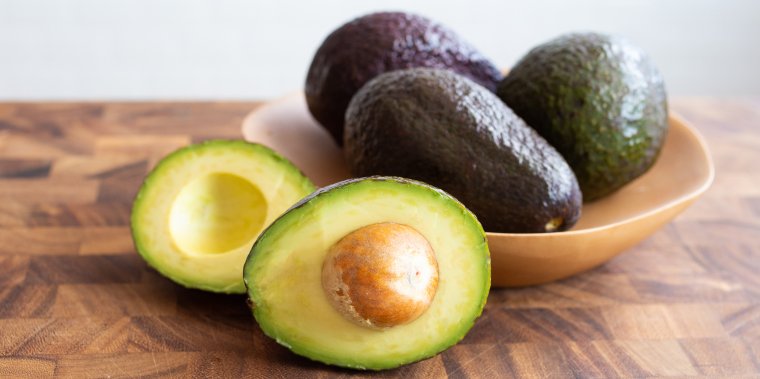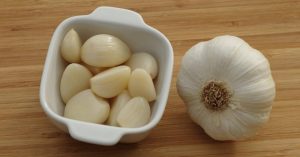Avocados contain many essential nutrients and are therefore linked to a variety of health benefits {1, 2, 3}.
When eaten in excess, however, avocados may trigger headaches in some people due to their tyramine content.
Especially overripe avocados can be very high in tyramine because tyramine levels increase in fruits as they ripen {4, 5}.
Headache specialists suggest that foods high in tyramine may induce headaches in those who are sensitive to tyramine {6, 7, 8, 9}.
In this article, we’ll cover the potential connection between avocados and headaches in detail.
Tyramine & Avocados & Headaches
First, let’s understand how tyramine may cause headaches in some people. This will in turn help us understand why tyramine-rich avocados are linked to headaches.
Here are the details…
Tyramine is an amino acid found in some foods. It also occurs naturally in the human body.
According to WebMD, tyramine helps the brain and nervous systems work normally.
For most people, the body is able to break down excess tyramine effectively with a digestive enzyme called monoamine oxidase. This prevents excessive tyramine accumulation in the blood.
However, some people have low levels of monoamine oxidase. This can be due to their genetic makeup or because of certain medications they use, such as MAOIs {10, 11, 12, 13}.
Having low levels of monoamine oxidase in the body is called tyramine sensitivity.
Tyramine-sensitive people can end up having too much tyramine in their system if they eat foods high in tyramine.
Medical experts suggest high amounts of tyramine in the body can increase blood pressure and cause headaches, among other symptoms {6, 8, 14, 15, 16}.
It is believed that some migraine patients are tyramine sensitive, therefore they are often advised to limit their tyramine intake.
Since ripe and overripe avocados contain a significant amount of tyramine, these healthy tropical fruits are associated with headaches.
Tyramine Content of Avocados
According to an article published in Oxford Academic; the tyramine level in avocados is said to be 23 mg in 1 kg. However, whether this is for fresh or ripe avocados is unspecified.
In fact, it may not be logical to indicate the amount of tyramine found in the avocado because tyramine levels change as the fruit ripens.
Tyramine levels change in food overnight, points out Familial Dysautonomia Now Foundation.
Typically, though, ripe and overripe avocados are considered high in tyramine while fresh unripe avocados are said to contain a moderate amount of this amino acid {4, 17, 18}.
Experts Say Ripe Avocados May Induce Headaches
“Avocados, raspberries, plums, figs, and dried fruits are best to be avoided if you are prone to migraines,” indicates Dr Vernon Rowe, a practising Neurologist and founder of the Rowe Institute of Neurology.
“Ripe bananas and ripe avocados can trigger headaches because they contain high amounts of tyramine,” says, Jennifer Kriegler (MD), a neurology specialist at the Cleveland Clinic.
According to Tiffany Rios (a registered dietitian and certified diabetes educator with Shore Physicians Group); people prone to headaches should not eat overripe avocados or bananas because they are high in tyramine and therefore can cause headaches.
Avocados Are on the Lists!
The Cleveland Clinic published an article that provides very useful information about the relationship between headaches and foods. The article contains a list showing the foods highly associated with headaches. Avocados are on the list! Cleveland Clinic notes that this list was made based on mostly patient self-reports, not based on scientific studies.
Cedars-Sinai has a dietary guideline for vestibular migraine, a type of migraine that presents with dizziness and vertigo. According to the guideline, avocados are among the fruits that should be avoided by those who have this type of migraine.
The National Headache Foundation listed foods that are safe for headaches sufferers as well as foods that have the potential to cause headaches. Avocados are in the “Use with Caution” column on the list.
University of California, Berkeley, published a comprehensive article about headaches. The article contains a list showing potential dietary migraine triggers. According to the list, avocados (especially overripe avocados) are potential migraine triggers.
Are Avocados a Headache Trigger for You?
If you suspect that eating avocados gives you a headache, you might be susceptible to tyramine, which is found in many foods.
To figure out whether your headaches are caused or aggravated by tyramine, you may need to eliminate or limit tyramine intake for a period of time, such as 3 to 4 weeks.
If your symptoms improve during this elimination phase, it may signify that tyramine is a potential headache trigger for you.
The National Headache Foundation lists the foods that may trigger migraine headaches due to their high tyramine content. The list (link) will tell you which foods to avoid or limit if you need to follow a low-tyramine diet.
If possible, work with a dietitian who specialises in migraine diet. With the help of your dietitian, you can better understand whether there is a correlation between your tyramine intake and migraine episodes.
Researchers suggest that identifying personal migraine-inducing foods and limiting their consumption can be an effective and reliable way to reduce migraine attacks.
Conclusion
When it comes to migraine headaches, foods seem to play a part among other triggers.
Even highly nutritious foods are associated with headaches, such as garlic, onion, watermelon, tomatoes, nuts, bananas and oranges {18, 19}.
The American Migraine Foundation suggests that people with migraines should try to identify potential food triggers and limit their consumption.
In this article, we investigated the connection between avocados and headaches and concluded that ripe and overripe avocados may induce headaches in some people due to their high tyramine content.
Considerations
Headaches, particularly migraine headaches, can be debilitating and lower the quality of life significantly. So, if you suffer from constant headaches, you should consider working with your doctor!
As for the foods that may give you headaches, if possible: work with a credentialed dietitian. Your dietitian can help you identify your potential food triggers.




